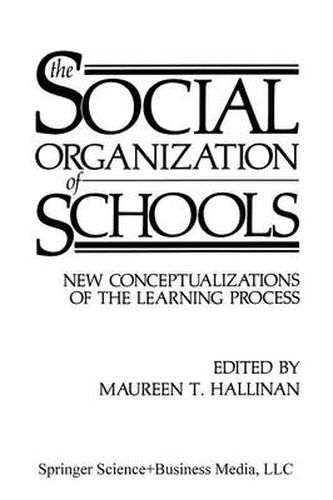Readings Newsletter
Become a Readings Member to make your shopping experience even easier.
Sign in or sign up for free!
You’re not far away from qualifying for FREE standard shipping within Australia
You’ve qualified for FREE standard shipping within Australia
The cart is loading…






This title is printed to order. This book may have been self-published. If so, we cannot guarantee the quality of the content. In the main most books will have gone through the editing process however some may not. We therefore suggest that you be aware of this before ordering this book. If in doubt check either the author or publisher’s details as we are unable to accept any returns unless they are faulty. Please contact us if you have any questions.
This volume addresses key issues in the sociology of education concerning how schools are organized for instruction and what processes link school organization and instruction to educa tional achievement. The content of the chapters represents a shift in focus from traditional and even recent themes in soci ology of education, including the study of school effects and of classroom processes, to a concern with the social organization of schools and its consequences for student outcomes. Rather than reviewing or evaluating existing research, the chapters present new and developing conceptualizations of the school ing process and provide theoretical models to guide future empirical work on schools. A unique feature of this book is its heavy emphasis on theory. Each chapter presents a theoretical model or argument concerning an issue of central importance in sociology of edu cation. The empirical analyses and simulations that are included are often more for illustrative purposes than for rigorous hypothesis testing, and some chapters have no data analysis at all. The major strength of the volume, therefore, lies in the new conceptualizations and reconceptualizations it provides of fundamental processes relating school organization to student learning. Theoretical work such as this is exactly what is needed in an area that has traditionally been, for the most part, empir ical and atheoretical. Another important feature of this volume is the various approaches it presents to the study of school organization.
$9.00 standard shipping within Australia
FREE standard shipping within Australia for orders over $100.00
Express & International shipping calculated at checkout
This title is printed to order. This book may have been self-published. If so, we cannot guarantee the quality of the content. In the main most books will have gone through the editing process however some may not. We therefore suggest that you be aware of this before ordering this book. If in doubt check either the author or publisher’s details as we are unable to accept any returns unless they are faulty. Please contact us if you have any questions.
This volume addresses key issues in the sociology of education concerning how schools are organized for instruction and what processes link school organization and instruction to educa tional achievement. The content of the chapters represents a shift in focus from traditional and even recent themes in soci ology of education, including the study of school effects and of classroom processes, to a concern with the social organization of schools and its consequences for student outcomes. Rather than reviewing or evaluating existing research, the chapters present new and developing conceptualizations of the school ing process and provide theoretical models to guide future empirical work on schools. A unique feature of this book is its heavy emphasis on theory. Each chapter presents a theoretical model or argument concerning an issue of central importance in sociology of edu cation. The empirical analyses and simulations that are included are often more for illustrative purposes than for rigorous hypothesis testing, and some chapters have no data analysis at all. The major strength of the volume, therefore, lies in the new conceptualizations and reconceptualizations it provides of fundamental processes relating school organization to student learning. Theoretical work such as this is exactly what is needed in an area that has traditionally been, for the most part, empir ical and atheoretical. Another important feature of this volume is the various approaches it presents to the study of school organization.